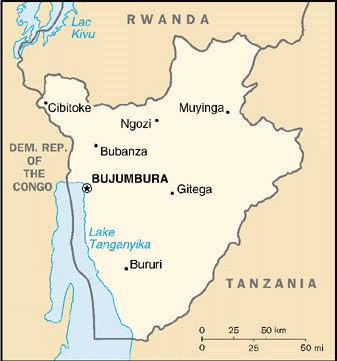

Status Quo Side: Government (Tutsi dominated)
Non-Status Quo Side: Hutus
Region: Africa
Conflict Type: Primarily Internal
Issues in Dispute: Ethnic
Maps: [U Texas Burundi maps]
In Burundi (85% Hutu, 14%Tutsi, 1%Twa) power struggles between King and Tutsi leaders necessitated Hutu alliances, thus permitting more Hutu participation than in ethnically identical Rwanda. Tutsis feared loss of power from UN pressure on Belgium to democratize before 1962 independence. The king's son, of the Tutsi-dominated UPRONA party, was assassinated by Tutsi rivals in October 1961 politicizing ethnic ties. The monarchy, controlling both bureaucracy and army, deprived Hutu and most Tutsi of significant power.
The King called elections in May 1965, reneged on democratization when the Hutu party defeated UPRONA, introduced a second, nominated chamber, and rejected all Hutu nominees for Prime Minister. With fewer elected officials, every electoral route to Hutu power seemed foreclosed.
A weak Hutu coup attempt failed but the King fled. Hutu attacks on Tutsi in the provinces triggered a massive army response. Some hundred Hutu officers and politicians were executed in the capital, and 2500-5000 Hutu elsewhere. Army power was now unchallenged.
The new king was deposed by Captain Michel Micombero who declared a republic. Hutu politicians and soldiers staged a failed coup in 1969.
The Army response to a failed Hutu coup in 1972 killed 100,000-200,000, including virtually all educated Hutus, and spawned a like number of refugees.
Differences within the military elite were contained until 1976 when Micombero was overthrown by Col. Jean-Baptiste Bagaza who sought to pacify Hutu with land reform and economic development instead of political reform. He was replaced by coup in 1987 by Major Pierre Buyoya who continued the exclusion of Hutu from real power.
With rumors rampant in both communities that attacks by the other were planned, unannounced army maneuvers sparked Hutu to burn bridges to hinder the army, and caused the Tutsi to flee. Hutu interpreted the fleeing Tutsi as the signal of a pogrom and murdered some hundreds. The army then killed an estimated 15,000 Hutu.
Buyoya's attempts to lessen tension by reintroducing Hutu into his army and administration were resisted by the Bagaza faction and the army. A new constitution adopted by referendum in 1992, however, provided for representation by all ethnic groups. Unexpectedly a Hutu, Melichior Ndadaye, was elected President in June, 1993.
The President was assassinated when a failed coup left 100,000 dead, 600,000 refugees in neighboring countries, and one million internally displaced. The new President, Hutu Silvester Nibantunganya, failed to control the Tutsi-dominated army and died in a suspicious plane crash in April 1994.
An agreement on power-sharing was reached with UN help, and a weak coalition government took office.
Tutsi-led army attacks on Hutu civilians led to massive Hutu flight and almost complete ethnic segregation.
An OAU peace mission arrived. After 17,000 Hutu refugees were turned back at the Tanzanian border in January 1996, the UNSYG proposed sending guards to defend aid workers and a rapid-reaction force on standby in Zaire. The OAU approved but the Burundian army was opposed. The UNSC on March 5 1996 opted for diplomatic solutions, but by mid-1996 wholesale killings were reported by both Tutsi-dominated army and Hutu rebels. Regional sanctions were imposed accompanied by intense mediatory efforts, with former Tanzanian President Julius Nyerere as facilitator, paralleled by efforts by the St. Egidio community in Rome. In early June, 1998 President Pierre Buyoya signed into law a transitional constitution including in government the mostly Hutu Frodebu party plus other reforms. Later that month the warring factions agreed to a truce and another round of negotiations to end the fighting that had produced more than 150,000 casualties since 1993.
In January, 1999, Uganda, Kenya, and Tanzania announced suspension of economic sanctions. But in the fall of 1999, the Tutsi government began herding Hutu, mostly poor farmers, into "regroupement" camps, creating what observers called as "a human disaster", and aid groups including Doctors Without Frontiers, pulled out. As of early 2000, 800,000 people were in 50 camps. Nevertheless, peace talks were set to resume, and in February the government began sending some Hutu back to their homes.